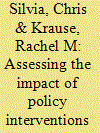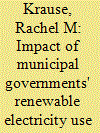| Srl | Item |
| 1 |
ID:
149986


|
|
|
|
|
| Summary/Abstract |
Heightened concern regarding climate change and energy independence has increased interest in plug-in electric vehicles as one means to address these challenges and governments at all levels have considered policy interventions to encourage their adoption. This paper develops an agent-based model that simulates the introduction of four policy scenarios aimed at promoting electric vehicle adoption in an urban community and compares them against a baseline. These scenarios include reducing vehicle purchase price via subsidies, expanding the local public charging network, increasing the number and visibility of fully battery electric vehicles (BEVs) on the roadway through government fleet purchases, and a hybrid mix of these three approaches. The results point to the effectiveness of policy options that increased awareness of BEV technology. Specifically, the hybrid policy alternative was the most successful in encouraging BEV adoption. This policy increases the visibility and familiarity of BEV technology in the community and may help counter the idea that BEVs are not a viable alternative to gasoline-powered vehicles.
|
|
|
|
|
|
|
|
|
|
|
|
|
|
|
|
| 2 |
ID:
114309


|
|
|
|
|
| Publication |
2012.
|
| Summary/Abstract |
Local governments are increasingly taking initiatives to reduce greenhouse gas (GHG) emissions. However, limited and inconsistent data makes evaluating the aggregate impact of relevant actions difficult. This paper focuses specifically on U.S. city governments' use of renewable electricity to power their own operations. It develops a range of rough estimates for the cumulative nationwide impact of this activity and finds that it results in an annual abatement of between 5.8 and 29.2 million metric tons of carbon dioxide equivalent (CO2e), with the best approximation being 6.2 million tons CO2e a year. This is about 20% of the estimated total that could be reduced if city governments used only renewable electricity to power their operations. Despite the considerable potential that remains untapped, even the maximum direct impact resulting from local government renewable electricity use is roughly estimated as less than 0.5% of total annual U.S. GHG emissions. Government procurement policies and "leading by example" provide opportunity for additional indirect impact.
|
|
|
|
|
|
|
|
|
|
|
|
|
|
|
|
| 3 |
ID:
126521


|
|
|
|
|
| Publication |
2013.
|
| Summary/Abstract |
This paper examines the extent of consumer knowledge about plug-in electric vehicles (PEVs) and the current policies in place to encourage their purchase and use. Data are collected via a survey administered to a sample of 2302 adult drivers in 21 of the largest cities in the United States. Almost two-thirds of the respondents provided incorrect answers to basic factual questions about PEVs and, of those, approximately 75% underestimated their private value or advantages. The vast majority (94.5%) of respondents were not aware of the current state and local incentives in place in their locale to encourage PEV purchase and use. Based on a review of consumer theory, multivariate models are developed and used to assess the factors associated with consumer interest in the two major types of PEV technologies, Battery Electric Vehicles (BEV) and Plug-in Hybrid Electric Vehicles (PHEV). Results show demographic and attitudinal characteristics having the largest influence on interest in either type of PEV. Misperceptions about purchase price and expected fuel and maintenance savings are likewise significant, although their impacts differ between BEVs and PHEVs. Better informing consumers about already available public incentives and advantageous aspects of existing PEV technologies offer promising steps toward their mass commercialization.
|
|
|
|
|
|
|
|
|
|
|
|
|
|
|
|